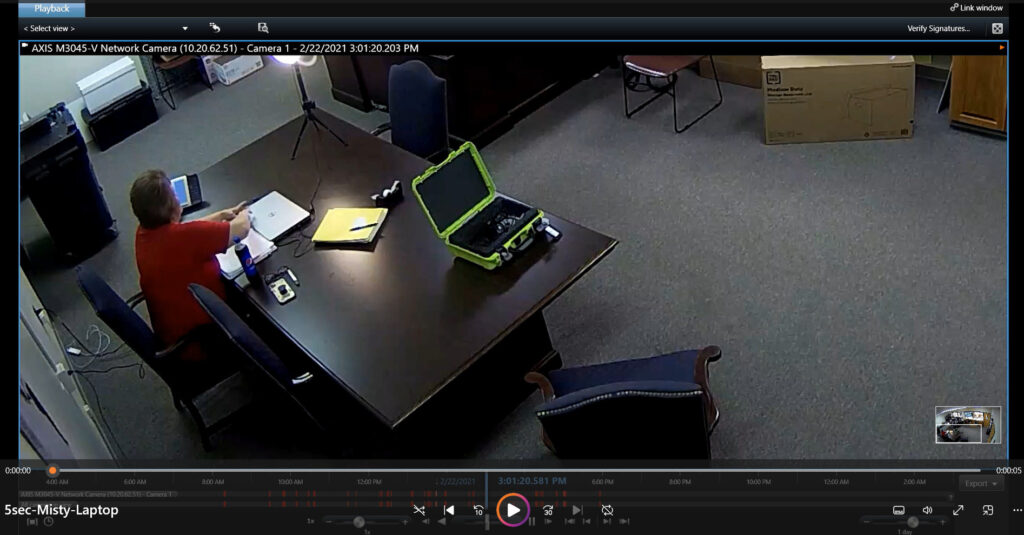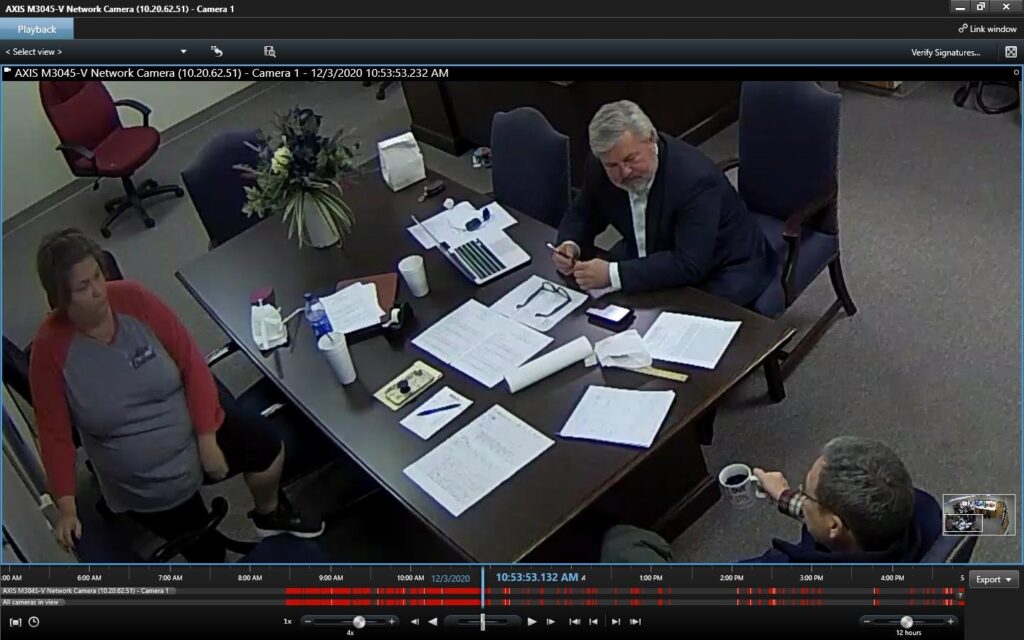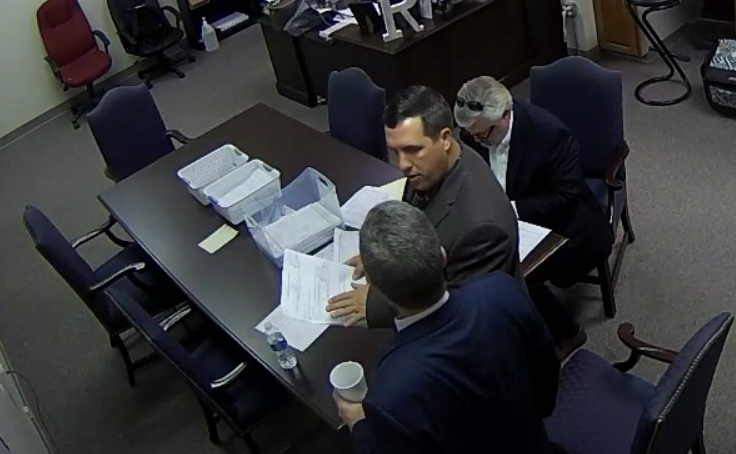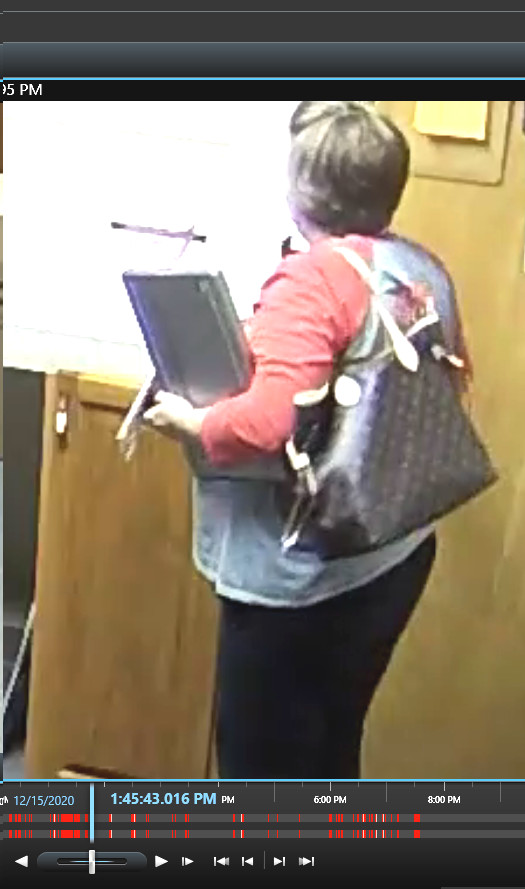
Note: All four surveillance images in this post, previously unpublished, are published here for the first time.
Today the Daily Dot published my new investigative article, entitled EXCLUSIVE: A missing laptop could be key to prosecuting Trump. This rural Georgia county only recently admitted that it exists. Prior to publication, I worked on it for about half a year.
Some material was cut to make the article shorter and more focused on the missing silver laptop.
However, of the cut passages, I can post below as paragraphs in a bullet-point list the ones that are, in my view, urgent and important. Think of them as DVD extras showing you deleted scenes from the theatrical release.
To be serious, I believe it might help residents of Coffee County—in the swing state of Georgia—as well as interested people elsewhere to have access to this information immediately. Without further ado:
- Here’s a summary of the breach by the federal judge presiding over Curling v. Raffensperger, Amy Totenberg in the Northern District of Georgia.
For her account of the intrusions, Totenberg drew on cybersecurity experts’ declarations—including their review of computer forensics and the surveillance footage—in a Nov. 10, 2023 ruling: the breach included “various individuals and entities (1) providing and gaining unauthorized access to Coffee County voting equipment, data, and software over the course of multiple dates; (2) copying, downloading, and imaging the County’s equipment, data, and software; (3) uploading and sharing that data and software on the internet via a file-sharing website; and (4) further distributing physical copies of forensic voting material downloaded from Coffee County.” (Online distribution was via private access, not public internet.) - Some, notably Coffee breach-funding lawyer and onetime Trump lieutenant Sidney Powell, who has pleaded guilty, have tried to justify the intrusions by claiming the elections board approved the electronic collection of the computers’ contents. They offer insufficient documentation to support this claim; further, no board quorum has ever been found to have authorized copying the elections data nor does the security video show any quorum in the elections office during the breach. In a deposition, then-Board of Elections chair Wendell Stone denied that the board gave permission to examine their systems. The civil disobedience or altruism arguments sometimes made are undercut by the plundered proprietary voting software, almost three years later, having never reached the public, nor rival political campaigns, only the breachers’ allies, as far as can be determined.
- If the subpoenas lawsuit is successful, it might spell out why the county’s public statements, which have focused on Hampton, have been so careful not to mention by name then-elections board member Eric Chaney, who was caught on film participating in the breach. “I didn’t do anything without the direction of Eric Chaney,” Hampton said in deposition. The plaintiffs in the subpoenas case go further, saying Chaney, who has not been charged, “warned Ms. Hampton of her impending termination the evening before” and characterizing him as a “key participant[] in planning and executing the breach.”
- A letter that counsel for the plaintiffs in the subpoenas case sent to county attorneys in April and filed this month argues that crucial Eric Chaney-related records were improperly withheld by county manager Wesley Vickers and senior county lawyer Tony Rowell, a pair multiple interviewees described to me as the area’s de facto diarchy.
- Examples of how the lawyers seem to have more power than the people they represent:
Listening to their lawyer Ben Perkins discuss legal issues at their Nov. 14 meeting, every elections board member said they were not informed of the desktop seizure before it happened, which he told them their then-underling, former election supervisor Rachel Roberts, had been involved in. Ernestine Thomas-Clark, who has long sat on the board, asked the lawyer to clarify how they could in theory terminate him when they hadn’t hired him. Fireable like any board vendor, Perkins was retained by county manager Vickers this June—an appointment some members have described as appearing out of nowhere one day, without their input or vote, something Perkins acknowledged in the meeting. Except for the two initial Oct. 24 motions, he has provided lawsuit filings to board members only when asked, according to board members who told me such requests were rare. - Surveillance footage—procured by Coalition for Good Governance despite months of Coffee claiming it had been irrevocably lost— shows senior county lawyer Tony Rowell in December 2020 meetings with people who would go on to participate in the breach. The plaintiffs’ analysis of the video shows that prior to the intrusions, Rowell spent hours and hours in the elections office with, among others, Misty Hampton, Eric Chaney, Ed Voyles, and Cathy Latham. Voyles, who has not been charged in the Georgia-Trump RICO case, chaired the elections board two years prior to the meetings. Latham, like Hampton a Trump co-defendant who has pleaded not guilty, chaired the Coffee Republican party at the time of the intrusions. Also a Trump fake elector (imposter in the Electoral College process), Latham was in a position to have possibly connected Coffee County with MAGA D.C. shortly before the breach.


- The Coffee County Commissioners, almost never mentioned in discussions on the breach and the most powerful county executives under law, have the ability to fire their vendor Hall Booth Smith—including Tony Rowell—and county manager Vickers, though not Oliver Maner (the elections board’s vendor for legal services). I repeatedly contacted all five commissioners with questions on the subpoenas lawsuit and a CCTV still of the silver laptop, asking if they’re satisfied with the performance of the county’s de facto diarchy. County commissioner Jimmy Kitchens told me “I have no comment”; county commissioner Oscar Paulk deferred to legal counsel Tony Rowell. The other three commissioners never responded.
- In Judge Totenberg’s same Nov. 10, 2023 ruling, she concisely addressed the underexamined cybersecurity plight of state voting systems and the possible ripple effects of the breach: “The importance of the security, reliability, and functionality of state election systems, classified by the U.S. Homeland Security Department as critical national infrastructure, cannot be overstated in a world where cybersecurity challenges have exponentially increased in the last decade. The dynamics of how a breach in one part of a cyber system may potentially carry cybersecurity reverberations for the entire system for years to come exemplifies the important concerns raised in this case.”
- The Curling v. Raffensperger plaintiffs seek to force the swing state of Georgia to (on the vote capture side) abandon mandatory electronic ballots and in most circumstances use hand-marked paper ones, that will (on the vote tallying side) still be scanned by computers but always audited.
- The GBI report (critique; critique) omits reference to the silver Hewlett Packard altogether and instead, any laptops it mentions are either nondescript or an old black Toshiba. Their report acknowledges that the Toshiba had last been used in 2015—the Obama era, and thus not relevant to the breach, the run-up to it, or the aftermath, except as a red herring that the county many times brought up in place of the silver laptop.
Also per the GBI report, in August 2022, surrounded by three of his lawyers—including Rowell of the de facto diarchy—recently resigned elections board chair Wendell Stone refused to participate when the Bureau tried to interview him in person. Then, making his public statement in June 2023, Stone promised “transparent” elections to the locals in front of him—but did not share that eight days earlier, the GBI had seized their elections office desktop. - Local lawyer Jim Hudson’s proposal for independent and possibly pro bono counsel and the idea of asking the Department of Justice for help are not necessarily mutually exclusive. Hudson’s idea, while nebulous to some ears, at best would allow those most affected by the intrusions—Coffee voters—to participate in a bottom-up inquiry into all aspects of the breach and its aftermath, aided by the independent counsel and able to notify the Justice Department of any criminality discovered. The Department of Justice, by contrast, boasts multistate range and federal muscle, but without a strong defense of the local public interest in place, they would risk being seen, fairly or not, as just another set of politicized outsiders, at worst sparking more resentment than repair.
- A November poll in the New York Times shows Trump ahead of President Joe Biden in five of six battleground states, including Georgia. Legally, nothing prevents an incarcerated individual from running for president, nor indeed, from serving as president. However, the Supreme Court might affirm state or local officials disqualifying Trump due to his inciting of the Jan.6 auto-coup attempt. If not, my guess is, Mar-a-Lago house arrest would be set up for such a presidency.
- My final two paragraphs from an earlier iteration of the article:
With bold leadership missing like a silver laptop, jitters about the GBI or other law enforcement behind every Eastern red cedar—paranoid or justified—proliferate; simultaneously, the known extent of the Trumpers’ multistate breach plot grows, reminding voters from coast to coast that their jurisdiction could have been hit. “Scared to death” Matthew McCullough, fulminating against the Georgia Bureau of Investigation, must not be the only Coffee County official afraid “to go to jail.”
Aside from the immense force of the breach records lawsuit and its costs, it seems the only way the county’s status quo will change is if the region’s residents, perhaps in conjunction with the DOJ, perhaps aided by Hudson’s vision for independent counsel, reshape the area’s stepped landscape of power themselves. The Trump era cannot be locked up by any prosecutor, nor can it be compartmentalized away with the click of a television remote—the healing of truth and reconciliation would be more realistic. Cyber–vulnerable Election 2024 is less than a year away. Self-governance requires effort.



This blog post, Extra material for my Daily Dot investigative article about Coffee County, Georgia missing laptop likely relevant to Curling and Trump cases, by Douglas Lucas, is licensed under a Creative Commons Attribution-NonCommercial-ShareAlike 4.0 International License (summary). The license is based on the work at this URL: https://douglaslucas.com/blog/2023/12/19/extra-material-dailydot-investigative-article-laptop/. You can find the full license (the legalese) here. To learn more about Creative Commons, I suggest this article and the Creative Commons Frequently Asked Questions. Please feel free to discuss this post (or the underlying article) in the comments section below, but if you’re seeking permissions beyond the scope of the license, or want to correspond with me about this post (or the article) one on one, email me: dal@riseup.net. And gimme all your money!
 Twitter:
Twitter:
0 comments ↓
There are no comments yet...Kick things off by filling out the form below.
Leave a Comment